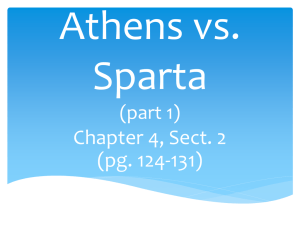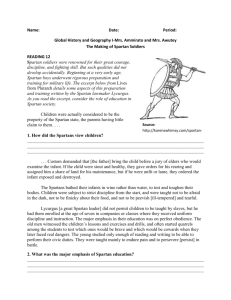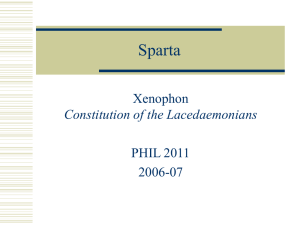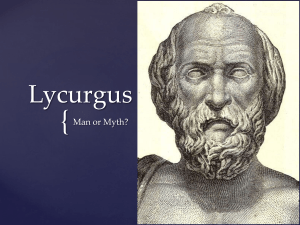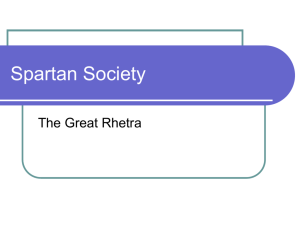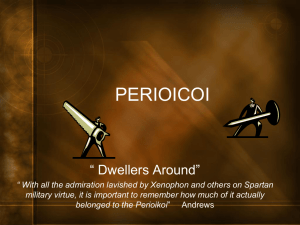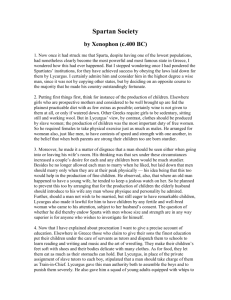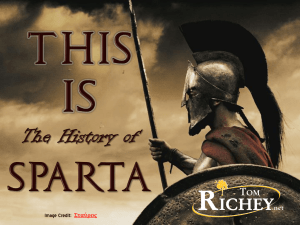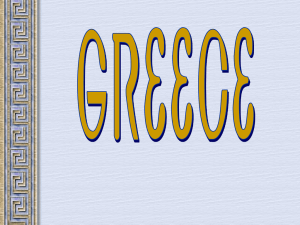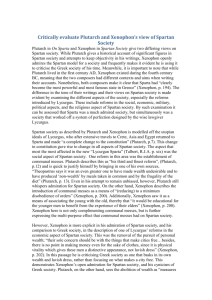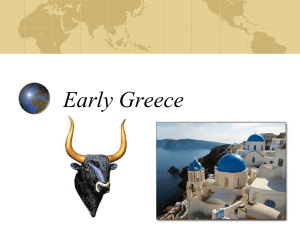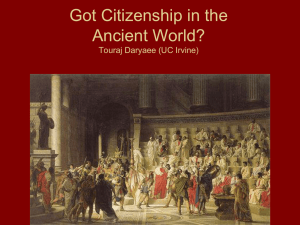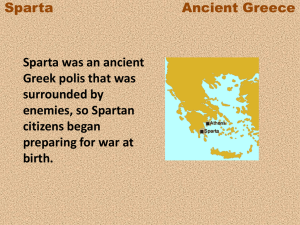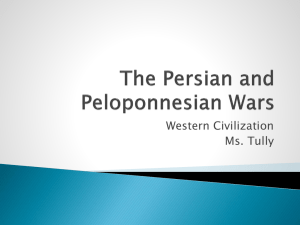Milesian and Other Presocratic Philosophers
advertisement
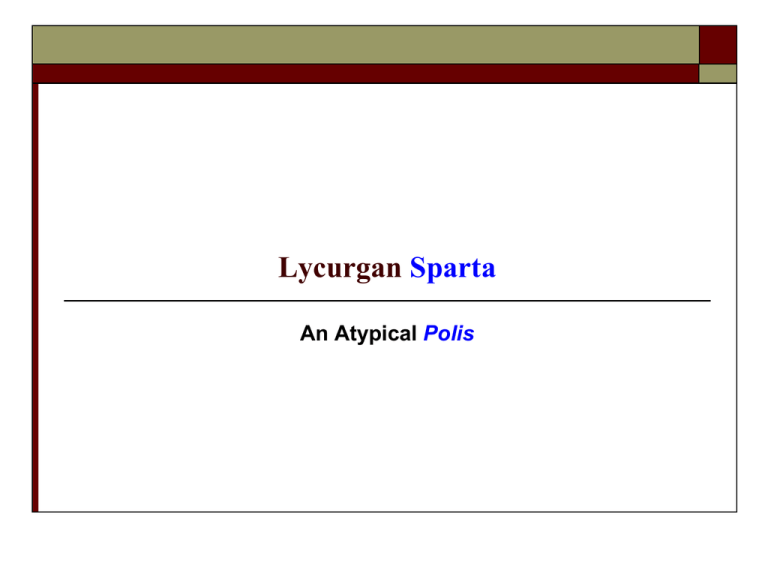
Lycurgan Sparta An Atypical Polis Sparta and the Peloponnesus Typology of Polis Evolution Stasis: External Outlet for Internal Pressures Colonization Monetization Trading Networks Tyranny Public Works provide Employment Cultural Development/Intellectual Stimulation (Plastic Arts, Lyric Poetry, Scientific Inquiry) Sparta as “Abnormal State”: “Internal Colonization” with Brutal Institutional Controls against Political/Social Revolution Early Sparta Neolithic Community to the south of historical Sparta Bronze Age settlement to the northeast Archaeology: typical break at the end of the Bronze Age Rudimentary conditions during the sub-Mycenaean and Dark Ages (Spartan foundation associated with the “Return of the Heracleidae” and the Dorian Invasion) Incorporation of Sparta town and surrounding villages by about 700 BCE (synoecism) Early Prosperity: dedications at sanctuary of Artemis Orthia Visitations by Foreign Poets Stasis: sending out of colony to Taras (southern Italy), ca. 700 BCE Alcman’s “Maiden Song” (Seventh Century BCE) Luxury of purple dye, All we have can never help us, Not the carved bracelet-snake, Not the wimple sheer in gold, Lydian, the pride and glory Of the girls with delicate eyes. Spartan Dancing Girl (Bronze Figurine) Early Sparta: Ruins of Ancient Theater Athletics in Ancient Sparta Sparta: Ancient Walls Sparta Lycurgus and the Spartan Constitution (Great Rhetra) Lycurgan Eunomia (legendary law giver, ca. 885 BCE?) Kings (Agids and Eurypontids). War Generals; Religious Functions Gerousia = body of elders (28 aristocrats, age 60 or older + 2 kings). Advisors; “Supreme Court” Ephors (5) - annually-elected; executive, judicial, and disciplinary powers; but see Plutarch, Lycurgus 7, who states that the ephorate was established some 130 years after Lycurgus. Daily Administration Apella = assembly of Spartiates (full Spartan citizens); see Plutarch, Lycurgus 6 on the powers of the Spartan demos. Army and Assembly Kings and Lycurgan Sparta “I should like also to give an account of the compact established by Lycurgus between king and polis: for this is of course the only government which continues exactly as it was initially set up; other states, it will be found, have undergone and are still undergoing changes. He laid down that the king, by virtue of his descent from the god [Zeus, father of Herakles], should offer all the public sacrifices on behalf of the polis, and that he should lead the army to wherever the polis might send it. He also gave the kings the privilege of receiving portions from the sacrificial beasts, and allotted them choice lands in many of the surrounding poleis, enough to ensure them a moderate supply of everything but not riches in excess.” ~Xenophon, Constitution of the Spartans 15 Elders and Lycurgan Sparta Among the many innovations made by Lycurgus the first, and the greatest, was the establishment of the gerousia. This, as Plato says, when mixed with the ‘feverish’ rule of the kings and possessing voting equality with them in matters of the greatest importance, created a government secure and sensible. Previously the state had been wayward, inclining at some times in the direction of the kings, towards tyranny, and at others in the direction of the masses, towards democracy. Now, however, it had the office of the gerontes set at its center, creating equilibrium just as a ship’s ballast does, and thus securing the safest and most orderly arrangement: when a stand needed to be made against democracy the 28 gerontes invariably sided with the kings, yet they also added strength to the people in preventing the establishment of a tyranny. ~Plutarch, Lycurgus 5 Ephorate and (Post?) Lycurgan Sparta This was how Lycurgus achieved the mixture in his political system. The oligarchical element in it, however, was still unmixed and strong; and his successors, seeing it, as Plato says, ‘swelling and fuming, set the power of the ephors as a kind of bridle on it.’ It was about 130 years after Lycurgus, during the reign of King Theopompus, that the first ephors, Elatos and his colleagues, were appointed. ~Plutarch, Lycurgus 7 The People and Lycurgan Sparta (Plutarch, Lycurgus 6) “When the populace was assembled, Lycurgus permitted no one else except the Elders and kings to make a proposal, although the authority to decide upon what the latter put forward did belong to the people. Later, however, when the people distorted the proposals and mauled them by their deletions and additions, the kings Polydorus and Theopompus supplemented the rhetra as follows: ‘If the people should make a crooked choice, the Elders and the founder-leaders are to set it aside’ that is, not to confirm it, but to withdraw it completely and to dismiss the people because they are altering and reformulating the proposal contrary to what was best.” Lycurgus and the Mixed Constitution System of “Checks and Balances” Monarchy, Aristocracy, Democracy Spartan Eunomia Admired by Plato and later Political Theorists Inspiration for the British Constitutional Monarchy and the American “Founding Fathers” Spartan Hoplite and Phalanx Messenian Wars: Dramatic Redirection Spartan Conquest of Messenia in later Eighth Century BCE Spartans Defeated at Hysiae by Argos in 669 BCE (see Pausanias, 2.24.7) Tradition of two wars against Messenia (“Second Messenian War” ca. 650 BCE) Territory annexed; population enslaved (Helots) Sparta evolves into militaristic, communistic state (disappearance of luxury, imports, poetry, arts) Spartiates: several thousand full Spartan citizens become full-time hoplites, living together in common military barracks (syssitia); on active service until after 60; debarred from agricultural labor and business activity State-arranged marriages; ephorate and new births; common education for men and women (agoge); Spartiates as Homoioi (“Equals”) Krypteia (“Secret Police”) and Large Subject Population Mount Taygetus Tyrtaeus: Nationalist Spartan Poet (Seventh Century BCE) Our sovereign Theopompus, whom the gods did love, Through whom we took Messenia’s broad dance-grounds, Messenia good to plough and good to plant for fruit. To conquer her they fought full nineteen years Steadfastly as ever, with endurance in their hearts, those spearmen of our fathers’ fathers’ time, And in the twentieth the foe took flight, and left their fertile farms among Ithome’s heights. Tyrtaeus: Nationalist Spartan Poet (Seventh Century BCE) Let every man, then, feet set firm apart, bite on his lip and stand against the foe, His thighs and shins, his shoulders and his chest all hidden by the broad bulge of his shield. Let his right hand brandish the savage lance, the plume nod fearsomely above his head. By fierce deeds let him teach himself to fight, and stand out of the fire—he has a shield— But get in close, engage, and stab with lance or sword, and strike his adversary down. Plant foot by foeman’s foot, press shield on shield, thrust helm at helm, and tangle plume with plume, Opposing breast to breast: that’s how to fight, With the long lance or sword-grip in your hand. Tyrtaeus: Nationalist Spartan Poet (Seventh Century BCE) [The enslaved Messenians were] like donkeys suffering under heavy loads, By painful force compelled to bring their masters half Of all the produce that the soil brought forth. …making a wailing funeral chorus, they and their wives, When one of their masters met his destiny. Spartan “Iron-Bar” Currency He [Lycurgus] also set about dividing up their movable property, in such a way as to abolish the inequality and disparity once and for all; but when he saw that they were not at all happy about having it taken from them directly, he adopted another course and overcame their greed by political measures. First of all he declared all gold and silver coinage invalid and prescribed the use of iron currency only. Furthermore, to a great and weighty bulk of this he assigned a trifling face value, so that a quantity worth a considerable sum required a large household storeroom to keep it in and a pair of oxen and a cart to move it about! ~Plutarch, Lycurgus 9 Spartan Eunomia and Spartan Fear Now we all know that Sparta is the place above all others where men obey the officials and the laws (nomoi). I personally believe, however, that Lycurgus did not so much attempt to establish this sort of disciplined behavior until he had persuaded the most powerful men in the polis to share his views. My proof of this? In other poleis the more influential men do not wish even to give the appearance of being afraid of those in office, which they consider to be an act of servility. Yet in Sparta it is the leading men who are most deferential to the officials, and whose greatest pride is to abase themselves—to run, not walk, whenever they are called upon. They do this in the belief that if they themselves lead the way in eager obedience the rest will follow; and this is exactly what has happened. ~Xenophon, Constitution of the Spartans 8 Exiled Spartan King Demaratus to Persian Monarch Xerxes I (Herodotus, 7.104) And so it is with the Spartans: in single combat they are as good as any, but when they fight together they are the best soldiers in the world. And the reason for this? Well, they are free men, certainly, but their freedom is not absolute: they have a master set over them, Law (nomos), whom they fear much more than your subjects fear you. At any rate, whatever this master orders, they do; and what he orders is always the same thing—never flee from the battlefield, no matter how large the opposing forces, but stay in the line, to conquer or to die.” Spartan Xenophobia (Plutarch, Lycurgus 27) This was the reason Lycurgus did not grant them freedom to leave home, if they wanted to, and wander around picking up alien habits and imitating the lives of uneducated peoples who lived under different political systems. On the contrary he actually drove away the multitudes who had streamed into the polis for no useful purpose. This he did not, as Thucydides [2.39.1] asserts, out of apprehension that they might wish to copy his constitution and learn something advantageous about the pursuit of excellence (arete), but in order to prevent their becoming teachers of any sort of evil. For the inevitable fact is that alien people bring in with them alien principles; and from novelty in principles follows novelty in decisions, something which is bound to give rise to many experiences and policies destructive to the harmony, as it were, of the established constitution. So he thought it more necessary to protect the polis from being filled with bad habits than to keep out infectious diseases. Spartan Expansion (8th-5th centuries) Sparta and Peloponnesus Perioikoi; Neodamones (Freedmen); Hypomeiones (“Inferiors”); Mothones (Illegitimate offspring of Spartiates and Helots) Peloponnesian League League members help Sparta control Helot population Sparta supports broadly-based oligarchies throughout the Peloponnesus Spartan Foreign Policy Conservative; averse to foreign ventures Primary concern: Control of Helot population “Narrow and Peloponnesian” viewpoint Late Sixth/Early Fifth Century BCE: Reputation of Hoplite Invincibility (Spartan “War Machine”) Conspiracy of Cinadon (397 BCE) In the streets also, the informer said, Cinadon pointed out as enemies here one and there two who met them, and all the rest as allies [of the conspirators]; and of all who chanced to be on the country estates belonging to Spartiates, while there would be one whom he would point out as an enemy, namely the master, yet there would be many on each estate named as allies. When the ephors asked how many Cinadon said there really were in the secret of this affair, the informer replied that he said in regard to this point that those who were in on the secret with himself and the other leaders were by no means many, though trustworthy; the leaders, however, put it this way, that it was they who knew the secret of all the others—Helots, freedmen, lesser Spartiates, and Perioikoi; for whenever among these classes any mention was made of Spartiates, no one was able to conceal the fact that he would be glad to eat them raw. ~Xenophon, Hellenica 3.3.5-7 Sparta, Helots, and Culture of Fear Spartiates outnumbered by Helots 7:1 “most institutions among the Spartans have always been established with regard to security against the helots.” (Thucydides, 4.80.3) Helots “are like someone sitting in wait for disasters to strike the Spartans.” (Aristotle, Politics, 1269a)

